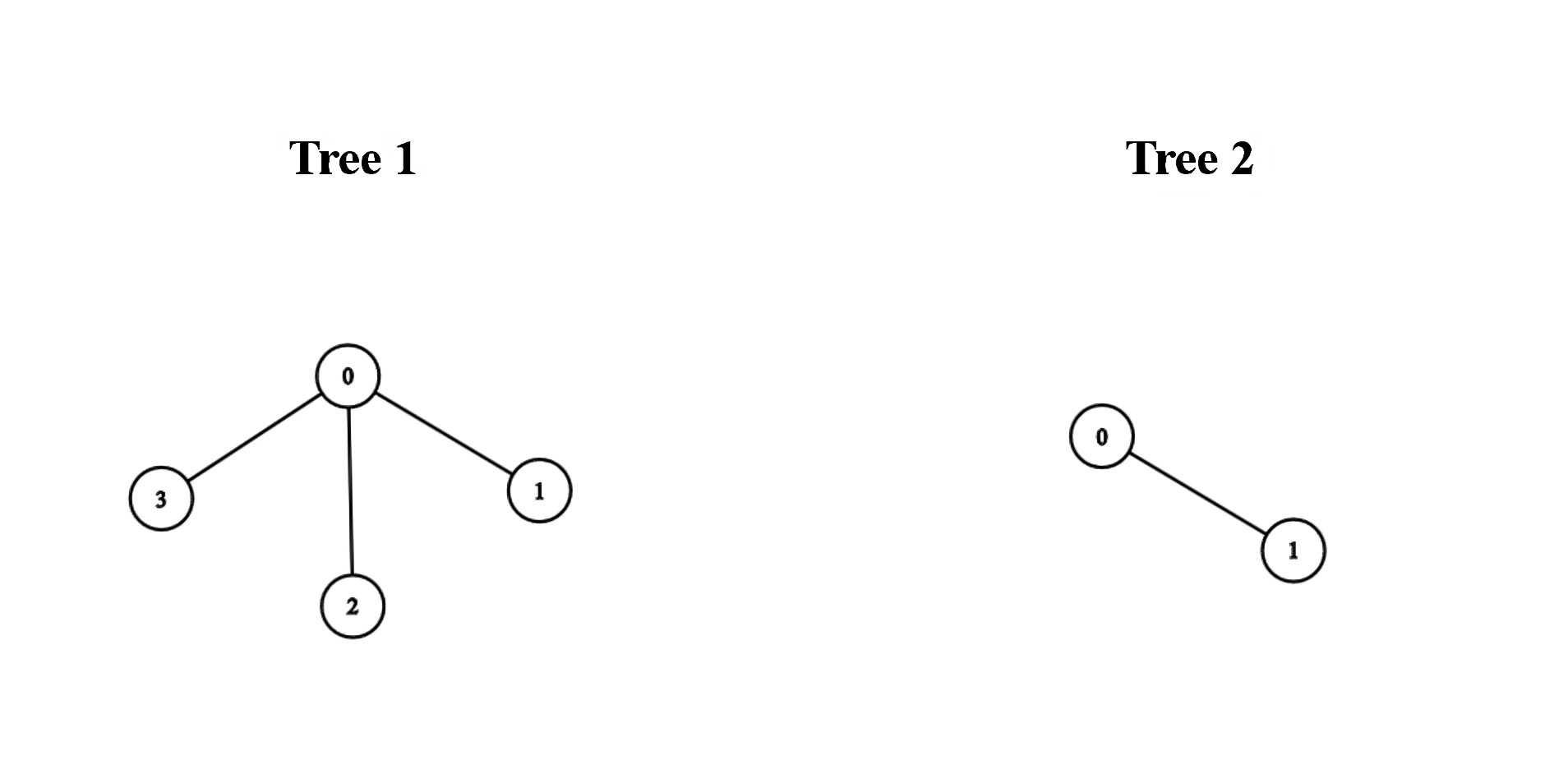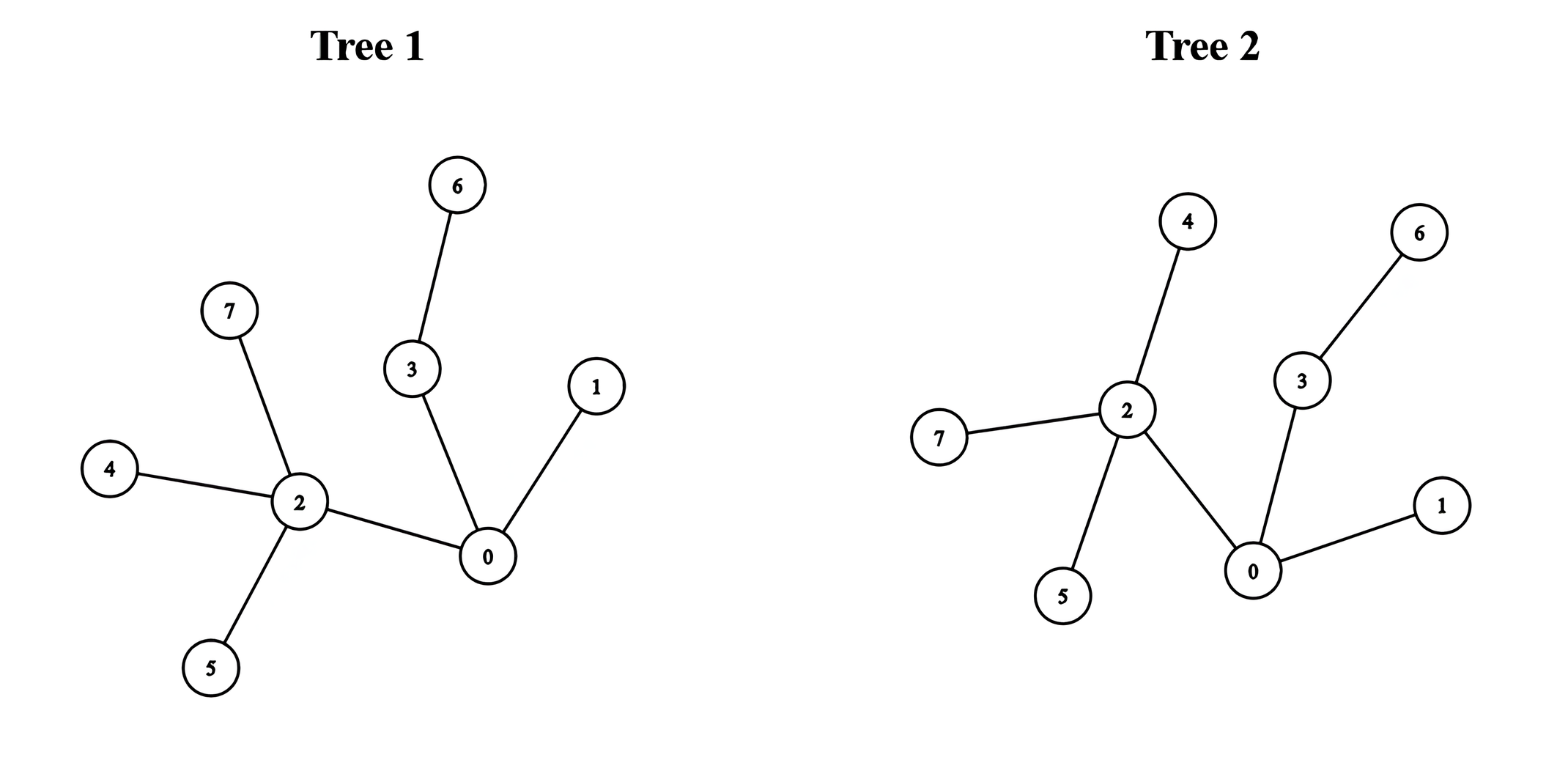LeetCode in Kotlin
3203. Find Minimum Diameter After Merging Two Trees
Hard
There exist two undirected trees with n and m nodes, numbered from 0 to n - 1 and from 0 to m - 1, respectively. You are given two 2D integer arrays edges1 and edges2 of lengths n - 1 and m - 1, respectively, where edges1[i] = [ai, bi] indicates that there is an edge between nodes ai and bi in the first tree and edges2[i] = [ui, vi] indicates that there is an edge between nodes ui and vi in the second tree.
You must connect one node from the first tree with another node from the second tree with an edge.
Return the minimum possible diameter of the resulting tree.
The diameter of a tree is the length of the longest path between any two nodes in the tree.
Example 1:
Input: edges1 = [[0,1],[0,2],[0,3]], edges2 = [[0,1]]
Output: 3
Explanation:
We can obtain a tree of diameter 3 by connecting node 0 from the first tree with any node from the second tree.
Example 2:

Input: edges1 = [[0,1],[0,2],[0,3],[2,4],[2,5],[3,6],[2,7]], edges2 = [[0,1],[0,2],[0,3],[2,4],[2,5],[3,6],[2,7]]
Output: 5
Explanation:
We can obtain a tree of diameter 5 by connecting node 0 from the first tree with node 0 from the second tree.
Constraints:
1 <= n, m <= 105edges1.length == n - 1edges2.length == m - 1edges1[i].length == edges2[i].length == 2edges1[i] = [ai, bi]0 <= ai, bi < nedges2[i] = [ui, vi]0 <= ui, vi < m- The input is generated such that
edges1andedges2represent valid trees.
Solution
import kotlin.math.max
class Solution {
fun minimumDiameterAfterMerge(edges1: Array<IntArray>, edges2: Array<IntArray>): Int {
val n = edges1.size + 1
val g = packU(n, edges1)
val m = edges2.size + 1
val h = packU(m, edges2)
val d1 = diameter(g)
val d2 = diameter(h)
var ans = max(d1[0], d2[0])
ans = max(
((d1[0] + 1) / 2 + ((d2[0] + 1) / 2) + 1),
ans,
)
return ans
}
private fun diameter(g: Array<IntArray?>): IntArray {
val n = g.size
val f0: Int
val f1: Int
val d01: Int
val q = IntArray(n)
val ved = BooleanArray(n)
var qp = 0
q[qp++] = 0
ved[0] = true
run {
var i = 0
while (i < qp) {
val cur = q[i]
for (e in g[cur]!!) {
if (!ved[e]) {
ved[e] = true
q[qp++] = e
}
}
i++
}
}
f0 = q[n - 1]
val d = IntArray(n)
qp = 0
ved.fill(false)
q[qp++] = f0
ved[f0] = true
var i = 0
while (i < qp) {
val cur = q[i]
for (e in g[cur]!!) {
if (!ved[e]) {
ved[e] = true
q[qp++] = e
d[e] = d[cur] + 1
}
}
i++
}
f1 = q[n - 1]
d01 = d[f1]
return intArrayOf(d01, f0, f1)
}
private fun packU(n: Int, ft: Array<IntArray>): Array<IntArray?> {
val g = arrayOfNulls<IntArray>(n)
val p = IntArray(n)
for (u in ft) {
p[u[0]]++
p[u[1]]++
}
for (i in 0 until n) {
g[i] = IntArray(p[i])
}
for (u in ft) {
g[u[0]]!![--p[u[0]]] = u[1]
g[u[1]]!![--p[u[1]]] = u[0]
}
return g
}
}

